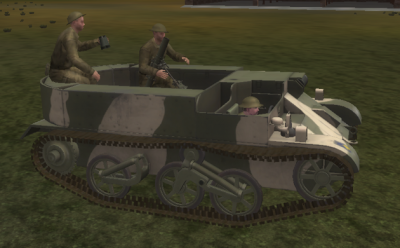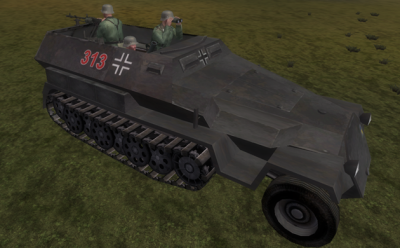Difference between revisions of "81mm(3inch) Mortar"
| (5 intermediate revisions by the same user not shown) | |||
| Line 1: | Line 1: | ||
{| class="wikitable floatright" | {| class="wikitable floatright" | ||
| Line 24: | Line 23: | ||
{| class="wikitable floatright" | {| class="wikitable floatright" | ||
| colspan="2" style="text-align: center;" | [[File: | | colspan="2" style="text-align: center;" | [[File:DE_81mm-Mortar.png|400px]] | ||
|- style="background:#666600; color:#fff;" | |- style="background:#666600; color:#fff;" | ||
| colspan="2" style="text-align: center;" | '''SdKfz 251/2 Ausf. C 81mm Mortar''' | | colspan="2" style="text-align: center;" | '''SdKfz 251/2 Ausf. C 81mm Mortar''' | ||
| Line 45: | Line 44: | ||
|} | |} | ||
=History= | |||
The origins of the Universal Carrier family can be traced back generally to the Carden Loyd Tankettes family, which was developed in the 1920s, and specifically the Mk VI Tankette.<br> | |||
In 1934, Vickers-Armstrongs produced, as a commercial venture, a light tracked vehicle that could be used either to carry a machine gun or to tow a light field gun. The VA.D50 had an armored box at the front for driver and a gunner and bench seating at the back for the gun crew.<br> | |||
The first WWII Online platform that is motorized with true indirect fire with ranges up to 2,500 meters. Each of these platforms has specific characteristics so learn their strengths and limitations. | |||
The Universal Carrier was ubiquitous in all the theatres during the Second World War with British and Commonwealth armies,[10] from the war in the East to the occupation of Iceland.[11] Although the theory and policy was that the carrier was a "fire power transport" and the crew would dismount to fight, practice differed. It could carry machine guns, anti-tank rifles, mortars, infantrymen, and supplies. | |||
=Game Play= | |||
'''Updated 81mm Mortar Guide:''' https://drive.google.com/file/d/1NWtnF5Ab5mb-FgCLGLiiXzUzB2uBTd85/view?usp=sharing | |||
[[Category:Field Pieces]] | [[Category:Field Pieces]] | ||
Latest revision as of 03:44, 26 November 2023

| |
| Universal Carrier 3 Inch Mortar | |
| Specifications | |
| Type | Mortar |
| Armament | 3inch Mortar Shell |
| Maximum Range | 2,500 m |
| Maximum Speed | 48 km/h |
| Crew | 3 |
| Weight | 3,345 kg |
| Tow Class | Medium |

| |
| SdKfz 251/2 Ausf. C 81mm Mortar | |
| Specifications | |
| Type | Mortar |
| Armament | 81mm Granatwerfer 34 Mortar |
| Maximum Range | 2,400 m |
| Maximum Speed | 58 km/h |
| Crew | 3 |
| Weight | 8,010 kg |
| Tow Class | Medium |
History
The origins of the Universal Carrier family can be traced back generally to the Carden Loyd Tankettes family, which was developed in the 1920s, and specifically the Mk VI Tankette.
In 1934, Vickers-Armstrongs produced, as a commercial venture, a light tracked vehicle that could be used either to carry a machine gun or to tow a light field gun. The VA.D50 had an armored box at the front for driver and a gunner and bench seating at the back for the gun crew.
The first WWII Online platform that is motorized with true indirect fire with ranges up to 2,500 meters. Each of these platforms has specific characteristics so learn their strengths and limitations.
The Universal Carrier was ubiquitous in all the theatres during the Second World War with British and Commonwealth armies,[10] from the war in the East to the occupation of Iceland.[11] Although the theory and policy was that the carrier was a "fire power transport" and the crew would dismount to fight, practice differed. It could carry machine guns, anti-tank rifles, mortars, infantrymen, and supplies.
Game Play
Updated 81mm Mortar Guide: https://drive.google.com/file/d/1NWtnF5Ab5mb-FgCLGLiiXzUzB2uBTd85/view?usp=sharing